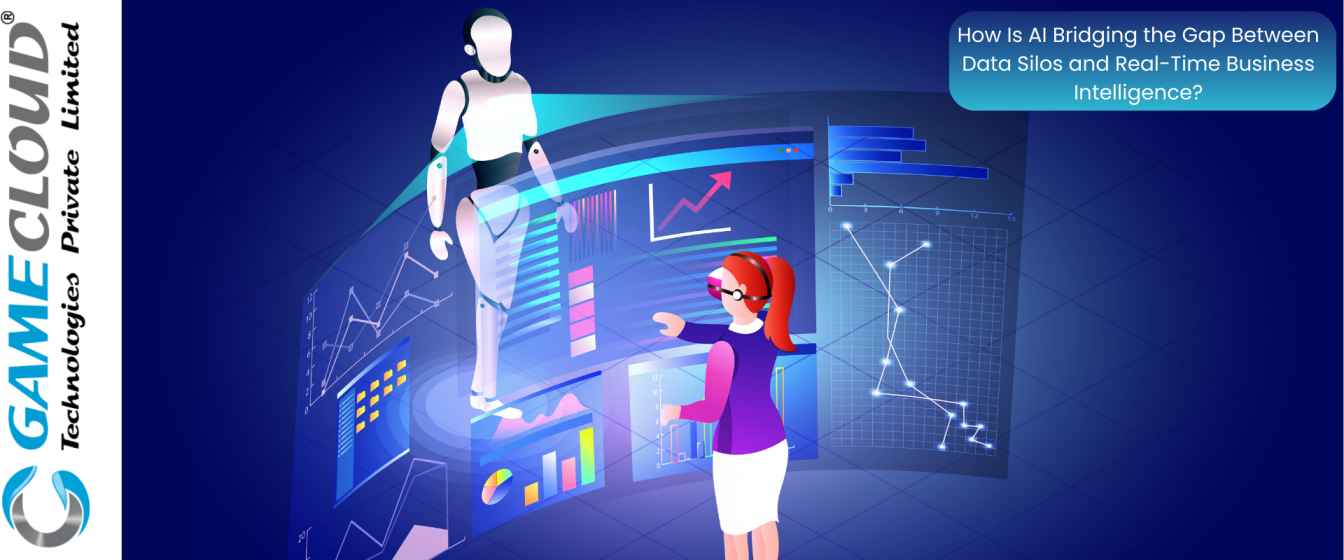
In today’s data-driven landscape, companies generate vast amounts of information across various platforms and systems. Yet, these data assets often remain isolated in “data silos” — separate repositories that hinder easy access and integration. AI has emerged as a transformative tool to bridge these silos, enabling businesses to transform scattered data into actionable real-time insights.
Understanding Data Silos and Their Challenges
Data silos are isolated collections of data that are often inaccessible to other departments or systems. These silos can form due to differences in departmental priorities, incompatible software systems, or even geographical separations within an organization. For example, marketing might store data in one platform, while sales and finance maintain separate systems. This lack of integration often results in incomplete insights, inefficiencies, and missed business opportunities.
AI: The Key to Breaking Down Data Barriers
- AI excels at interpreting and analyzing vast amounts of data from various sources. AI algorithms can identify patterns, trends, and correlations that might be missed when data remains isolated. By using AI-driven tools, companies can aggregate data from multiple silos, harmonize it, and produce a single, unified view of their operations. This comprehensive insight is essential for real-time business intelligence, which relies on updated and integrated data to deliver timely insights.Moreover, AI-powered solutions, such as machine learning algorithms and NLP, can simplify the process of data extraction and transformation, making it easier for companies to integrate data silos without requiring complex, manual processes.
Real-Time Insights: A Competitive Advantage
The ability to access and analyze data in real-time can significantly enhance a company’s agility and responsiveness. Real-time BI fueled by AI empowers companies to make data-backed decisions as events unfold. This dynamic approach can offer a competitive edge in several ways:
- Improved Customer Experience: Real-time insights allow companies to monitor customer interactions across channels and adjust strategies on the fly, whether it’s personalizing product recommendations or responding quickly to customer complaints.
- Operational Efficiency: With instant access to integrated data, organizations can streamline workflows, identify bottlenecks, and allocate resources more effectively.
- Informed Decision-Making: Real-time BI supported by AI offers executives a continuous flow of data to support strategic decisions, enhancing the company’s overall agility.
For instance, a study by McKinsey shows that businesses using real-time analytics driven by AI are 23% more likely to outperform their competitors in operational efficiency.
The Role of AI-Driven Data Integration Tools
AI-driven data integration tools simplify connecting data from various sources, making the process faster and more efficient. Traditional integration methods often involve time-consuming, manual data entry and are prone to errors. AI integration tools, however, automate data collection and standardization, ensuring accuracy and consistency across departments.
Popular AI tools, like RPA and intelligent data processors, streamline data integration by performing repetitive tasks autonomously. Additionally, these tools can detect discrepancies and provide predictive analytics to support future planning.
Addressing Data Privacy and Security with AI
While AI offers robust solutions to bridge data silos, it’s essential to ensure that privacy and security measures are in place. AI can play a proactive role here as well, using machine learning algorithms to detect potential breaches, anomalies, and other security threats in real-time.
By combining AI with robust security practices, organizations can protect sensitive data while maximizing the value they derive from it. This balance of data accessibility and security is crucial for companies that want to leverage real-time BI without compromising privacy or compliance requirements.
Experience Innovation First: AI Solutions with a Results-Driven Approach at Ankatmak
At Ankatmak, the AI and IT consultancy division of GameCloud, we are dedicated to delivering cutting-edge IT consultancy and AI solutions tailored to diverse business needs. Our team specializes in creating custom chatbots, advanced business intelligence tools, and more, with a commitment to quality and impact. With our unique “Results First, Pay Later” approach, we give clients the opportunity to experience our expertise firsthand before any financial commitment, ensuring they see the true value we bring to their business.
Conclusion
In a world of dispersed data, AI provides the means to unite and unlock siloed information, transforming it into actionable, real-time insights. This integration empowers businesses to make informed decisions, optimize operations, and enhance customer experiences—ultimately securing a competitive edge in today’s fast-paced market.
For Know More Contact-Now
FAQs for : How Is AI Bridging the Gap Between Data Silos and Real-Time Business Intelligence?
What are data silos, and why are they a problem for businesses?
Data silos are isolated repositories of information that are inaccessible to other systems or departments within an organization. They create inefficiencies by limiting data sharing, resulting in incomplete insights, missed opportunities, and duplication of efforts.
How does AI help in breaking down data silos?
AI can integrate and analyze data from multiple silos using tools like machine learning algorithms and natural language processing (NLP). These tools harmonize disparate datasets, enabling businesses to create unified views of their operations and derive actionable insights.
What are the benefits of using AI for real-time business intelligence?
AI-powered real-time BI enhances decision-making by providing up-to-date insights. It helps improve customer experiences through personalized interactions, streamlines operations by identifying inefficiencies, and supports executives in making agile, data-driven decisions.
Are AI-driven data integration tools better than traditional methods?
Yes, AI-driven tools are faster, more efficient, and less prone to errors than traditional methods. These tools automate data extraction, integration, and standardization, ensuring accuracy and consistency while saving time and resources.
How does AI address data privacy and security concerns?
AI enhances data security by using machine learning algorithms to detect anomalies, breaches, and potential threats in real time. Combined with robust privacy practices, AI ensures that businesses can access and leverage data safely while maintaining compliance with regulations.
